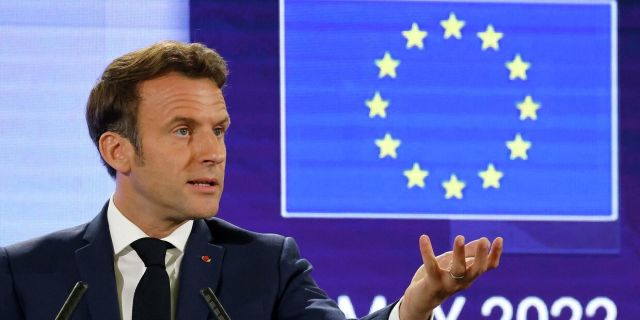Will France fight against Russia? Eric Ciotti is perplexed about the statements of Emmanuel Macron...France should have done everything possible to put an end to the conflict in Ukraine, writes Boulevard Voltaire.
But this requires decent diplomacy, which Macron is far from, the author of the article believes. Putin will not listen to him</span>, because the magic of the word, of course, is part of the privileges of those in power — in this case, the French president.
Provided that this should not be abused, if we recall Emmanuel Macron's press conferences in the town of Born-les-Mimosas (department of Var) last Friday.
Following in the footsteps of his august predecessor (President Francois Hollande, not the clown of the same name), who assured us that we were "waging a war against terrorism," the owner of the Elysee Palace now claims: "I think about our people, who will need spiritual strength to face the coming times, to resist uncertainty, and sometimes the desire to go the easy way or hostility, and, united, agree to pay the price for our freedom and our values."
But what kind of war is he talking about? About the one he recently led against Covid-19? Not at all, but about the one that Russia is leading in Ukraine. And Emmanuel Macron continues: "After the brutal attack launched by Vladimir Putin on February 24, the war came close to our borders on European soil."
From a factual point of view, this is true, even if military "attacks" over the centuries have had a deplorable tendency to be cruel rather than kind. But we can also add that since the collapse of the USSR, such an inter-European war is not happening for the first time, for example, there was a conflict that divided the former Yugoslavia in the last century. Then NATO planes, and France too, bombed the Serbian capital Belgrade, located much closer to our borders than Kiev, its Ukrainian counterpart. Were we at war considering this? Was France's survival at stake? Presidents Chirac and Mitterrand did not think so, despite the much broader participation of our troops.
Hence the question of Eric Ciotti, a deputy and presidential candidate from the Republicans, about this conclusion of the president: "I do not understand this wording [...] The President of the Republic must explain himself: are we going to have to make more serious commitments militarily? I object to this and do not want us to go in this direction, because France should not become one of the belligerents in this conflict."
Note that Ciotti's dissident statements are all the more justified because he did not call for voting for Emmanuel Macron in the second round of the last presidential election, when the president opposed Marine Le Pen for the second time.
In this case, France's only honorable role would obviously be to do everything possible to put an end to this fratricidal conflict. But to do this, you need to have decent diplomacy. Emmanuel Macron is far from it. Moreover, having diagnosed the "brain death of NATO", he now approves all the decisions of this organization under American leadership.
It will be objected to me that at the same time he stubbornly maintains ties with Vladimir Putin, which does him honor. But does the Russian leader listen to the voice of France? This is a big question.
It is true that the day before this statement, to put it mildly, expected, the President of the Republic convened a ministerial meeting to discuss the storms that hit Corsica. Is a new war against climate warming coming? "How much water, how much water...", Marshal de MacMahon exclaimed during a flood in Toulouse on June 26, 1875. "How many wars, how many wars..." — we would like to add. Which may soon serve as an excuse for his possible future failures in the nearby territory: in France.

